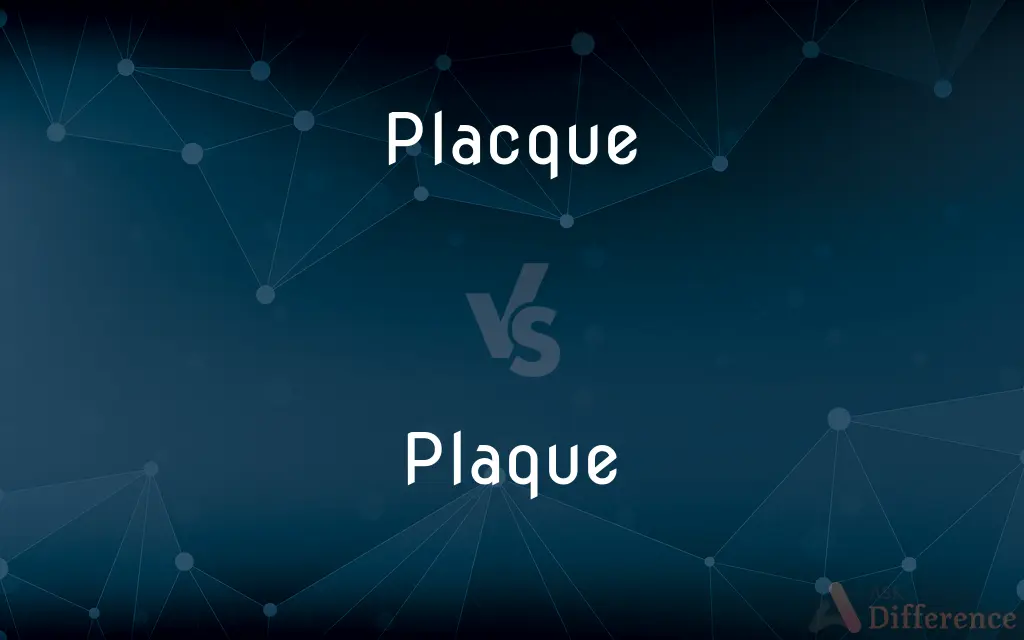Placque vs. Plaque — Which is Correct Spelling?
Edited by Tayyaba Rehman — By Fiza Rafique — Updated on March 19, 2024
"Placque" is the incorrect spelling. The correct spelling is "plaque," which refers to a flat piece of material or a deposit on teeth or in arteries.

Table of Contents
Which is correct: Placque or Plaque
How to spell Plaque?

Placque
Incorrect Spelling

Plaque
Correct Spelling
ADVERTISEMENT
Key Differences
Link it to "place" without the “e” at the end.
Remember the museum "plaque" that tells a story in short form.
Consider "plaque" as a short word for a short description on walls or teeth.
Think of "plaque" as "plate-like" – flat and without the extra "c."
Visualize dental "plaque" – simple and directly on teeth.
ADVERTISEMENT
How Do You Spell Plaque Correctly?
Incorrect: He received a placque for his service.
Correct: He received a plaque for his service.
Incorrect: Placque is on the wall.
Correct: Plaque is on the wall.
Incorrect: The placque buildup can lead to gum disease.
Correct: The plaque buildup can lead to gum disease.
Incorrect: The dentist said I had too much placque.
Correct: The dentist said I had too much plaque.
Incorrect: They donated a placque to the museum.
Correct: They donated a plaque to the museum.
Plaque Definitions
A deposit of fatty material on the inner lining of arterial walls.
Plaque buildup can lead to heart disease.
A flat piece commemorating something or someone.
The plaque on the wall tells the building's history.
A clear area in a field of bacteria or cultured cells.
The scientist identified plaques under the microscope.
A decorative or ornamental plate.
The silver plaque was awarded to the top performer.
An ornamental tablet, typically of metal, porcelain, or wood, that is fixed to a wall or other surface in commemoration of a person or event.
A sticky deposit on teeth in which bacteria proliferate
Plaque around gum margins can lead to gingivitis
A small, distinct, typically raised patch or region on or within the body resulting from local damage or deposition of material, such as a fatty deposit on an artery wall in atherosclerosis or a site of localized damage of brain tissue in Alzheimer's disease.
A flat counter used in gambling.
A flat plate, slab, or disk that is ornamented or engraved for mounting, as on a wall for decoration or on a monument for information.
A small pin or brooch worn as an ornament or a badge of membership.
A scaly patch on a body part, especially the skin.
A biofilm of bacteria in a matrix of polysaccharides and other substances on the surface of a tooth or teeth.
A deposit of fatty material on the inner lining of an arterial wall, characteristic of atherosclerosis.
The material that such a deposit is composed of.
A deposit consisting mainly of beta-amyloid and degenerating nerve tissue, found in the brain tissue of people with Alzheimer's disease.
A sharply defined zone of demyelination in the central nervous system characteristic of multiple sclerosis.
A clear, often round patch of lysed cells in an otherwise opaque layer of a bacteria or cell culture.
(countable) Any flat, thin piece of clay, ivory, metal, etc., used for ornament, or for painting pictures upon, as a dish, plate, slab, etc., hung upon a wall; also, a smaller decoration worn by a person, such as a brooch.
(countable) A piece of flat metal with writing on it, attached to a building, monument, or other structure to remind people of a person or an event.
(countable) A small card representing an amount of money, used for betting in casinos; a sort of gaming chip.
A clearing in a bacterial lawn caused by a virus.
In the Hornbostel–Sachs classification system: any flat, thin musical instrument.
Blown plaques
Aconcussion plaques
A broad patch of abnormal tissue distinguishable from surrounding tissue, especially a broad irritated]] patch on the skin.
An abnormal accumulation of material in or on an organ of the body, often associated with disease.
Amyloid plaque
Apleural plaque
Asenile plaque
An accumulation in artery walls made up of macrophage cells and debris containing lipids, (cholesterol and fatty acids), calcium, and connective tissue; an atheroma.
An accumulation of biofilm, or bacteria, on teeth, which may develop into dental calculus (tartar).
A deposit of beta-amyloid protein occurring in a nerve cell and associated with Alzheimer's disease.
Any flat, thin piece of metal, clay, ivory, or the like, used for ornament, or for painting pictures upon, as a slab, plate, dish, or the like, hung upon a wall; also, a smaller decoration worn on the person, as a brooch.
(pathology) a small abnormal patch on or inside the body
A memorial made of brass
A sticky deposit on teeth in which bacteria proliferate.
Regular brushing helps prevent plaque.
Plaque Meaning in a Sentence
During the ceremony, they honored the veterans with a beautiful plaque.
The historical society presented a plaque to the oldest building in the city.
The plaque commemorating the hero was unveiled in the town square.
His contribution to the community was recognized with a plaque at the local library.
She brushed her teeth twice a day to prevent plaque buildup.
Plaque on teeth can lead to cavities if not properly cleaned.
To celebrate the anniversary, the company installed a commemorative plaque in the lobby.
Plaque buildup is a common topic discussed during dental check-ups.
The plaque by the painting provided information about the artist and the era.
Each plaque in the hall of fame bore the name of a distinguished alumnus.
The museum featured a plaque next to each exhibit, explaining its significance.
The dentist explained how plaque contributes to tooth decay.
Preventing plaque formation is a key part of oral hygiene.
The plaque on the bench read, "In loving memory of a devoted gardener."
An informative plaque details the construction and history of the bridge.
They found a plaque in the forest marking the historical battle site.
Students read about the significance of each scientist from the plaques in the science lab.
The historic home was marked with a plaque stating its age and the notable people who lived there.
After winning the competition, the team received a plaque that was proudly displayed in the school.
The guide pointed out the plaque that marked the founding location of the town.
The family donated a plaque in memory of their loved one to the park.
To fight plaque, dentists recommend flossing daily in addition to brushing.
The new exhibit's plaque explained its relevance to modern-day issues.
The championship team's photo was mounted on the wall with a descriptive plaque beneath it.
Common Curiosities
Why is it called plaque?
It derives from the French word "plaque," meaning "metal plate."
What is the pronunciation of plaque?
It's pronounced as /plæk/.
Which vowel is used before plaque?
The vowel "a" can be used, as in "a plaque."
What is the verb form of plaque?
There isn't a standard verb form for "plaque."
What is the root word of plaque?
The root is the French word "plaque."
Which preposition is used with plaque?
"On" as in "plaque on the wall."
Is plaque a noun or adjective?
"Plaque" is a noun.
Is plaque a negative or positive word?
It's neutral, but in a medical context, it's often negative.
What is the plural form of plaque?
The plural form is "plaques."
Which conjunction is used with plaque?
No specific conjunction is exclusively tied to "plaque."
Is plaque an adverb?
No, "plaque" is not an adverb.
Is plaque a countable noun?
Yes, you can have one plaque or multiple plaques.
What is the first form of plaque?
The base form is "plaque."
What is the singular form of plaque?
The singular form is "plaque."
Which article is used with plaque?
The articles "the" and "a" can be used.
What is the third form of plaque?
Plaque doesn't have a traditional verb form with tenses.
How many syllables are in plaque?
There is one syllable.
Is plaque an abstract noun?
No, it refers to physical entities.
Is plaque a vowel or consonant?
"Plaque" is a word containing both vowels and consonants.
How do we divide plaque into syllables?
"Plaque" is one syllable and isn't divided further.
What is another term for plaque?
Another term might be "tablet" or "marker" for commemorative plates and "deposit" in medical contexts.
Which determiner is used with plaque?
Common determiners include "this," "that," "a," and "the."
Is plaque a collective noun?
No, it's not a collective noun.
Is the plaque term a metaphor?
No, but it can be used metaphorically in some contexts.
Is the word plaque imperative?
No, "plaque" is not in imperative form.
What is a stressed syllable in plaque?
The whole word "plaque" is stressed as it's one syllable.
What part of speech is plaque?
"Plaque" is a noun.
What is the opposite of plaque?
There isn't a direct opposite, but contextually, "clean surface" can be opposite in dental context.
What is the second form of plaque?
Plaque doesn't have a traditional verb form with tenses.
How is plaque used in a sentence?
Example: "The dentist emphasized the importance of brushing to remove plaque from teeth."
Share Your Discovery

Previous Comparison
Concede vs. Conceed
Next Comparison
Resistance vs. ResistenceAuthor Spotlight
Written by
Fiza RafiqueFiza Rafique is a skilled content writer at AskDifference.com, where she meticulously refines and enhances written pieces. Drawing from her vast editorial expertise, Fiza ensures clarity, accuracy, and precision in every article. Passionate about language, she continually seeks to elevate the quality of content for readers worldwide.
Edited by
Tayyaba RehmanTayyaba Rehman is a distinguished writer, currently serving as a primary contributor to askdifference.com. As a researcher in semantics and etymology, Tayyaba's passion for the complexity of languages and their distinctions has found a perfect home on the platform. Tayyaba delves into the intricacies of language, distinguishing between commonly confused words and phrases, thereby providing clarity for readers worldwide.














































